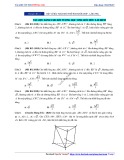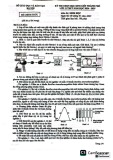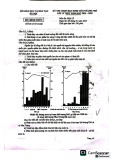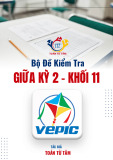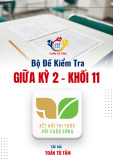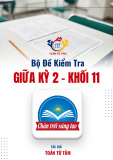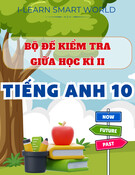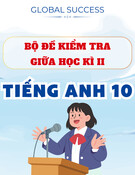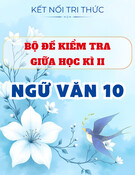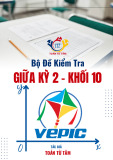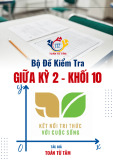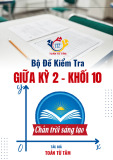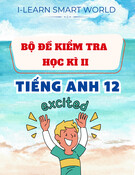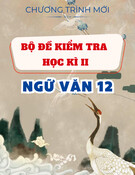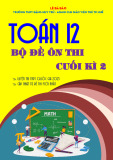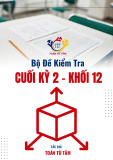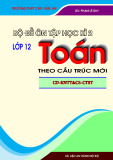
Trang 1/8 - Mã đề thi 132 - https://thi247.com/
SỞ GIÁO DỤC VÀ ĐÀO TẠO
THÁI BÌNH
Mã đề thi: 132
ĐỀ THI CHỌN HỌC SINH GIỎI LỚP 12 THPT NĂM HỌC 2022-2023
Môn: TIẾNG ANH
Thời gian làm bài: 90 phút, không kể thời gian giao đề.
(Đề gồm 08 trang; Thí sinh làm bài vào Phiếu trả lời trắc nghiệm)
Họ, tên thí sinh: ..................................................................... Số báo danh: .............................
Mark the letter A, B, C, or D on your answer sheet to indicate the sentence that best combines each pair
of sentences in the following questions.
1.
Professor Garcia went back to her office to prepare for her speech. She had answered some questions
on the situation in Poland on the TV news.
A.
Having been interviewed about the situation in Poland for the TV news, Professor Garda returned
to her office and got some notes ready for her speech.
B.
Professor Garcia had some notes that she was to use for her speech, and she used them in the
interview she had with the TV news over the crisis in Poland as well.
C.
Professor Garcia went back to her office to compose the speech that she was to give on the crisis in
Poland for the TV news.
D.
Because she had to explain the situation in Poland on the news on TV, Professor Garcia went back
to her office to get her notes sorted out.
2.
It was the height of summer when the town was flooded. Therefore, the humidity inside the houses
became much higher than normal.
A.
Since the town was usually flooded during the hottest part of the summer, the houses always got
very humid inside.
B.
The houses got far more humid inside than normal, because the flood happened during the hottest
part of the summer.
C.
The town had been flooded at the beginning of summer, and so the houses became more humid
inside than normal as the summer went on.
D.
Whenever the town was flooded in the middle of summer, it used to get much more humid inside
the houses than it normally was.
3.
Lucia was sure that something strange had happened to her in her dream. However, she couldn't
remember what it was.
A.
When Lucia began to recall her dream, she realized that it had been an unusual one.
B.
Lucia thought that, in her dream, an odd event had occurred, but she was unable to remember
whether it happened to her or someone else.
C.
Lucia was unable to picture what had befallen her in her dream, but she was convinced that it had
been something odd.
D.
Lucia had happened on a strange event in her dream, yet she tried to forget all about it.
4.
The thief appears to be perfectly open about his work. It has taken him around the world.
A.
Although he tries hard to look honest, we know that he is a global thief.
B.
The thief, who operates all over the world, does not seem to conceal anything about what he does.
C.
The thief seems to want to keep his career private, as he is wanted all over the world.
D.
Because he steals from all around the world, the thief is not completely honest when he speaks to
anyone.
5. Sequoya devised an alphabet. Because of this, all the different tribes could read a common language.
A. Sequoya devised an alphabet because all the different tribes could read a common language.
B. All the different tribes could read a common language which belonged to Sequoy.
C. All the different tribes could read a common language that Sequoya devised.
D. Sequoya devised an alphabet whereby all the different tribes could read a common language.
Mark the letter A, B, C or D on your answer sheet to indicate the word that differs from the rest in the
position of the main stress.
6. A. entertainment
B. patriotic
C. popularity
D. citizenship
7. A. argumentative
B. psychological
C. hypersentitive
D. contributory
8. A. blackmail
B. firewood
C. worldclass
D. wheelchair

Trang 2/8 - Mã đề thi 132 - https://thi247.com/
Mark the letter A, B, C or D on your answer sheet to indicate the word CLOSEST in meaning to the
underlined word in each of the following questions.
9. The principle of use and disuse states that those parts of organisms’ bodies that are used grow larger,
those parts that are not tend to wither away.
A. shrink
B. split
C. rot
D. perish
10. Many computers have a further field in the instruction, to specify subsidiary information required by an
operation.
A. technical
B. additional
C. confidential
D. important
11. The chairman’s thought-provoking question ignited a lively debate among the participants in the
workshop.
A. triggered
B. hosted
C. defined
D. arose
Mark the letter A, B, C or D on your answer sheet to indicate the word(s) or phrase(s) OPPOSITE in
meaning to the underlined word(s) in each of the following questions.
12. In order to foster the employment rate in this country, the government should create policies that can
attract international corporations.
A. accelerate
B. alleviate
C. curb
D. improve
13. I am just a cog in the machine in this organization as my contribution to it is still minor.
A. of complete indifference
B. pivotal
C. of little importance
D. negligible
14. Of course, for the students, who graduated last week, all the technological details of why and how were
peripheral to having a chance to learn the violin.
A. unimportant
B. negligible
B. marginal
D. significant
Mark the letter A, B, C, or D on your answer sheet to indicate the underlined part that needs correction in
each of the following questions.
15. "You didn't need to buy that", sighed my wife on hearing that I had purchased another vase.
A. didn’t need to buy
B. another
C. sighed
D. hearing
16. Puerto Ricans in the United States are a young and growing population whose numbers are increasing, and
the Puerto Rican community is becoming more politically active.
A. a young and
B. whose numbers are
C. community is becoming
D. politically active
17. During the first half of the nineteenth century, immigrants to the United States were predominant from
Western Europe; after the Civil War, however, new arrivals came mostly from Eastern and Southern Europe,
as well as from Asia.
A. mostly
B. as well as
C. predominant
D. immigrants
18. When searching for the buried treasure, we noticed a strange inhumane sound coming from a distant
place, warning about an animal lurking somewhere.
A. buried
B. lurking
C. inhumane
D. searching
19. During our tour of the refinery, it was seen that both propane and gasoline were produced in large volumes.
A. in large volumes
B. it was seen
C. and
D. of the refinery
Mark the letter A, B, C, or D on your answer sheet to indicate the sentence that is closest in meaning to
each of the following questions.
20. Arguing with the boss has considerably reduced his chances of promotion.
A. His promotion was certain until he had a dispute with the boss.
B. The likelihood of his being promoted has significantly decreased because of his arguments with the boss.
C. He would definitely have been promoted by now if he hadn't quarreled with the boss.
D. He argued with the boss about why he wasn't considered for promotion.
21. They would rather have gone to Jamaica for their vacation than to Marmaris, but it was beyond their
budget.
A. The trip to Jamaica they wanted for their holiday was too expensive for them, so they went to Marmaris.
B. They are going to Marmaris for their holiday, which is within their budget, but they’d actually want to
go to Jamaica.
C. Marmaris is cheaper than Jamaica, so they will spend their vacation there, even though they would
prefer to go to Jamaica.
D. They thought Jamaica would be a better place for a vacation than Marmaris, but they knew it would
cost too much money for people like them.

Trang 3/8 - Mã đề thi 132 - https://thi247.com/
22.
After three months of bloody fighting, the German army were driven back from Stalingrad, leaving
thousands of their colleagues trapped behind.
A.
The German army had to fight for three months to capture Stalingrad, but then they were forced to
withdraw, leaving behind thousands of dead.
B.
After three months of bloody conflict most of the German army drove back to Stalingrad while
thousands of their comrades remained behind.
C.
Thousands of German soldiers had to be abandoned in Stalingrad as the German army was forced
to retreat from the city, following a violent three- month conflict.
D.
The German army began to retreat, after three months of bloody fighting, without even attempting
to rescue thousands of soldiers kept as prisoner of war in Stalingrad.
23.
Oliver needn’t have gone outside to use the payphone because he could have made a call for free
from the one in the office.
A.
As it wouldn’t have cost Oliver anything to ring somebody up from the office, his use of the
payphone outside was unnecessary.
B.
Oliver did not make his call on the payphone outside, as he was able to make it for no money from
the one in the office.
C.
Had Oliver been allowed to make a call without paying for it from the office phone, he wouldn’t
have had to go outside and use the payphone.
D.
I wish Oliver hadn’t gone to use the payphone outside, since there is a phone in the office that he
could have used without paying.
24.
Although they taste nearly the same, both Sprite and Mountain Dew are two separate citrus-
flavoured soft drinks made by different companies.
A.
Produced by two different companies, Sprite and Mountain Dew, which are both citrus-flavoured
soft drinks, taste practically no different.
B.
Sprite and Mountain Dew are both manufactured by the same company, though they are similarly
tasting citrus-flavoured soft drinks.
C.
Although Sprite has a stronger citrus taste than Mountain Dew, basically they are the same soft
drink, though made by different companies.
D.
Not made by the same company, Sprite and Mountain Dew are different from one another in the
amount of their citrus flavouring.
Read the following passage and mark the letter A, B, C, or D on your answer sheet to indicate the correct
answer to each of the questions.
Finding the career that fits your personality
“If you've finished your exams and have absolutely no idea what to do next, you're not alone,” says
Sheridan Hughes, an occupational psychologist at Career Analysts, a career counseling service. “At 18, it
can be very difficult to know what you want to do because you don’t really know what you're interested in.”
Careers guidance, adds Alexis Hallam, one of her colleagues, is generally poor and “people can end up in the
wrong job and stay there for years because they're good at something without actually enjoying it.”
To discover what people are good at, and more fundamentally, what they will enjoy doing, Career
Analysts give their clients a battery of personality profile questionnaires and psychometric tests. An in-depth
interview follows, in which the test results are discussed and different career paths and options are explored
with the aid of an occupational psychologist. Career Analysts offers guidance to everyone, from teenagers to
retirees looking for a new focus in life. The service sounded just what I needed. Dividing my time as I do
between teaching and freelance journalism, I definitely need advice about consolidating my career. Being
too ancient for Career Analysts' student career option guidance and not, unfortunately, at the executive level
yet, I opted for the career management package. This is aimed at people who are established in their jobs
and who either want a change or some advice about planning the next step in their careers.
Having filled in a multitude of personality indicator questionnaires at home, I then spent a rather
grueling morning being aptitude-tested at Career Analysts’ offices. The tests consisted of logical reasoning
followed by verbal, mechanical and spatial aptitude papers. Logical reasoning required me to pick out the
next shape in a sequence of triangles, squares and oblongs. I tried my best but knew that it was really a lost
cause. I fared rather better when it came to verbal aptitude - finding the odd one out in a series of words
couldn't be simpler. My complacency was short-lived, however, when I was confronted with images of

Trang 4/8 - Mã đề thi 132 - https://thi247.com/
levers and pulleys for the mechanical aptitude papers. My mind went blank. I had no idea what would
happen to wheel X when string Y was pulled.
At home, filling in questionnaires, I had been asked to give my instinctive reaction (not an over-
considered one) to statements like: “It bothers me if people think I'm being odd or unconventional”, or “I
like to do my planning alone without interruptions from others”. I was asked to agree or disagree on a scale
of one to five with “I often take on impossible odds”, or “It is impossible for me to believe that chance or
luck plays an important role in my life”. I was told to indicate how important I consider status to be in a job,
and how important money and material benefits.
The questions attempt to construct a picture of the complete individual. Using aptitude tests alongside
personality profiling, occupational psychologists will, the theory goes, be able to guide a client towards a
rewarding, fulfilling career. Some questions are as straightforward as indicating whether or not you would
enjoy a particular job. Designing aircraft runways?
Preparing legal documents? Playing a musical instrument? Every career going makes an appearance
and, as I was shown later, the responses tend to form a coherent pattern.
Having completed my personality and aptitude tests, I sat down with Sheridan Hughes, who asked me
fairly searching personal and professional questions. What do my parents and siblings do for a living? Why
had I chosen to do an English degree? “I need to get a picture of you as a person and how you've come to be
who you are,” she explained. “What we do works because it’s a mixture of science and counseling. We use
objective psychometric measures to discover our clients' natural strengths and abilities and then we talk to
them about what they want from life”.
There were no real surprises in my own test results, nor in the interview that followed it. “We're
interested in patterns,” Mrs Hughes explained, “and the pattern for you is strongly verbal and
communicative”. This was putting it rather kindly. I had come out as average on the verbal skills test and
below average in logic, numerical, perceptual and mechanical reasoning. My spatial visualization was so
bad it was almost off the scale. “A career in cartography, navigation, tiling or architecture would not be
playing to your strengths,” she said delicately.
Mrs Hughes encouraged me to expand the writing side of my career and gave me straightforward,
practical suggestions as to how I could go about it. “Widen the scope of your articles,” she said. “You could
develop an interest in medical and psychological fields.” These latter, she said, would sit comfortably with
an interest in human behavior indicated on my personality-profiling questionnaires. She suggested that I
consider writing e-learning content for on-line courses, an avenue that would never have occurred to me.
25. What does the writer say about Career Analysts in the second paragraph?
A. She was initially doubtful that it could be useful to her.
B. The range of services it offers is unique.
C. It is about to offer a service for people at executive level.
D. Only one of its services was relevant to her.
26. What happened when the writer took the aptitude tests?
A. The papers were not what she had been expecting.
B. She put in very little effort on any of them.
C. She didn’t understand what she was required to do on one of them.
D. She found two of the papers extremely difficult.
27. The writer felt that during the interview, Mrs Hughes___________.
A. seemed surprised at how badly she had done in the tests
B. was being honest about her strengths and weaknesses
C. was keen not to upset her concerning her test results
D. preferred to avoid talking about her test results
28. Some of the questions Sheridan Hughes asked concerned the writer’s ____________.
A. relationships with family members
B. opinions of the tests and questionnaires
C. main regrets
D. progress through life
29. The advice Mrs Hughes gave to the writer included the suggestion that she should ____________.
A. increase the number of subjects she writes about
B. concentrate only on writing and not on any other kind of work
C. think about taking a course on writing
D. do something she had previously considered unappealing

Trang 5/8 - Mã đề thi 132 - https://thi247.com/
30. Which of the following is mentioned in the first paragraph?
A. People underestimating their own abilities.
B. People being unwilling to take risks.
C. People accepting inappropriate advice.
D. People constantly changing their minds.
31. What does the writer say about the statements on the questionnaires?
A. One of them concerned her current situation only.
B. She thought about them for longer than she was supposed to.
C. She found some of them rather strange.
D. One of them focused on her attitude to risk.
32. The phrase "off the scale" in paragraph 8 is closest in meaning to ___________.
A. immeasurably low
B. not so good
C. worrying
D. unsatisfactory
33. The writer says that the idea behind the questionnaires is that ___________.
A. people will find some of the questions quite hard to answer
B. the answers to them and the aptitude tests will provide all the necessary information
C. they will encourage people to have new ideas about possible careers
D. they will give a more accurate picture of people than the aptitude tests
34. The phrase "a lost cause" in paragraph 3 is closest in meaning to __________.
A. a shortcut
B. a vain attempt
C. a misjudgement
D. a dead-end
Choose the word that has the underlined part pronounced differently from that of the others.
35. A. cliché
B. mustache
C. niche
D. cache
36. A. accursed
B. ragged
C. crooked
D. darned
37. A. danger
B. ancient
C. chamber
D. ancestor
Read the following passage and mark the letter A, B, C, or D on your answer sheet to indicate the correct
answer to each of the questions.
The Digital Divide
Information technology is influencing the way many of us live and work today. We use the Internet to
look and apply for jobs, shop, conduct research, make airline reservations, and explore areas of interest. We
use e-mail and the Internet to communicate instantaneously with friends and business associates around the
world. Computers are commonplace in homes and the workplace.
Although the number of Internet users is growing exponentially each year, most of the world’s
population does not have access to computers or the Internet. Only 6 percent of the population in
developing countries are connected to telephones. Although more than 94 percent of U.S. households have a
telephone, only 42 percent have personal computers at home and 26 percent have Internet access. The lack
of what most of us would consider a basic communications necessity – the telephone – does not occur just in
developing nations. On some Native American reservations only 60 percent of the residents have a
telephone. The move to wireless connections may eliminate the need for telephone lines, but it does not
remove the barrier to equipment costs.
Who has Internet access? Fifty percent of the children in urban households with an income over
$75,000 have Internet access, compared with 2 percent of the children in low-income, rural households.
Nearly half of college-educated people have Internet access, compared to 6 percent of those with only some
high school education. Forty percent of households with two parents have access; 15 percent of female,
single-parent households do. Thirty percent of white households, 11 percent of black households, and 13
percent of Hispanic households have access. Teens and children are the two fastest-growing segments of
Internet users. The digital divide between the populations who have access to the Internet and information
technology tools is based on income, race, education, household type, and geographic location. Only 16
percent of the rural poor, rural and central city minorities, young householders, and single parent female
households are connected.
Another problem that exacerbates these disparities is that African-Americans, Hispanics, and Native
Americans hold few of the jobs in information technology. Women hold about 20 percent of these jobs and
are receiving fewer than 30 percent of the computer science degrees. The result is that women and members
of the most oppressed ethnic groups are not eligible for the jobs with the highest salaries at graduation.

